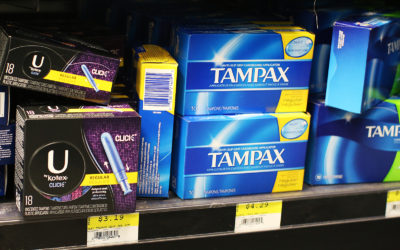
Two Boston University students are introducing a chapter of PERIOD., a national organization promoting menstrual health, to BU’s campus.
Eudora Olsen, programs director at PERIOD., said this is a youth-powered organization dedicated to serving disadvantaged menstruating women and changing the conversation around menstruation. There are over 100 registered campus chapters worldwide.
“They readily fundraise and distribute menstrual hygiene products to those in need,” Olsen said. “They also advocate, so a lot of our campus chapters do policy either at the school or local level to provide free menstrual hygiene products in their communities as well as abolish the luxury tax on tampons.”
Although the BU chapter hasn’t filled out their monthly survey detailing membership and upcoming events yet, Olsen said she anticipates the chapter’s fast growth.
“Boston is a pretty big hub for our chapters. We have quite a few there, and also our founder and executive director Nadya goes to Harvard in Boston, so it’s one of our major cities,” Olsen said.
Samira Saran, a freshman in the College of General Studies and BU’s chapter president, said she was inspired to create the club after noticing a lack of service clubs dedicated to niche subjects.
“I was definitely looking for smaller service-oriented projects that I personally could bring to BU, and PERIOD. is an organization that resonated with me deeply,” Saran said. “I think menstrual health is something that’s a personal issue not only to women but to the other 50 percent of the population as well. I feel like everyone has an obligation to be concerned about it.”
Saran said she enlisted the help of Kyra Gordon, a freshman in the Sargent College of Health and Rehabilitation Sciences, to incorporate Gordon’s perspective on public health policy.
Gordon, chapter vice president of PERIOD., said the organization has been working with directors within the Student Activities Office to reserve tables at the George Sherman Union to advertise and hold meetings in classrooms. A recent interest form garnered about 40 responses, largely freshman female students, and the group hopes to expand to at least 70 members, according to Gordon.
“Overall we want to spread our message … by working with other student organizations too because the first step to being known on campus is advertising,” Gordon said.
Saran said the club will be participating in an ongoing project throughout the year called the “packing party,” in which members will create packages of menstrual products to send to shelters and regions with disadvantaged menstruators.
Gordon added that the club hopes to offer free menstrual products in women’s restrooms and menstrual product trash cans in men’s restrooms on BU’s campus by the end of this year or next.
“We wouldn’t know but [men’s bathroom stalls] don’t actually have [trash cans for menstrual products] there, and for the transgender community especially, we need to acknowledge them,” Gordon said.
Several BU students said they hope BU’s PERIOD. chapter will combat the stigma around menstruation.
Tori Abdalla, a freshman in Sargent and new PERIOD. club member, said she was inspired to become involved when she learned of the difficulties homeless women face in accessing menstrual products.
“I wanted to create a club at my high school to help these women in South Florida. Sadly, because I was graduating soon, I could not, so I decided it was definitely something I wanted to get involved in or even help start in college,” Abdalla said. “I think most women have to deal with the stigma. It’s seen as a very private matter that should be dealt with in a private setting.”
Elena Allison, a freshman in the Questrom School of Business, said she thinks talking about periods will make them less taboo.
“People will be more open and comfortable with it,” Allison said. “I think people don’t like talking about it because they think it’s gross, which is strange because people talk about sex literally all the time.”
Kate Workman, a CGS freshman, said her experience as a lifeguard exposed her to the stigma around periods. Workman is now participating in HeForShe, an organization Workman said is considering sending menstrual products to people in other countries.
“I think a lot of stigma not even around periods but around everything, Planned Parenthood, all that kind of stuff, is all because people don’t know what they’re talking about,” Workman said. “They’re uneducated on these issues, so organizations like [PERIOD.] could definitely help.”





















































































































